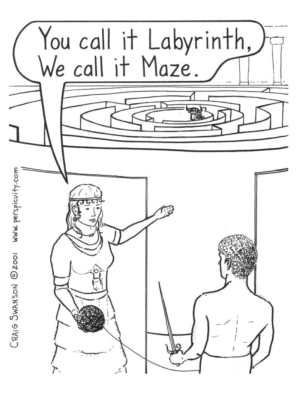Tuesday, June 23: Surprise Witness
Louis Willis returns with some thoughts on another name frequently dropped here at the CB offices, Jorge Luis Borges.
THE VERSATILITY OF THE MYSTERY SHORT STORY
by Louis Willis
“I have taken it to a symbolic level, which I am not sure is appropriate.”
—Jorge Luis Borges, “The Detective Story”
 After reading Robert’s article about the critic who thought a mystery novel transcended the genre, I wondered why some critics, despite its long history, still don’t consider mystery fiction literature. They ignore or are unaware that many great writers have admired the genre and also written mysteries. The anthology Murder & Other Acts of Literature, edited by Michele Slung, features stories of murder and other crimes by some of “the world’s greatest and most honored literary figures.” Furthermore, I discovered when I read the preface to the anthology, A Night in the Cemetery and Other Stories of Crime and Suspense, that my favorite short story writer, Chekhov, “begin his career as a crime and mystery writer.”
After reading Robert’s article about the critic who thought a mystery novel transcended the genre, I wondered why some critics, despite its long history, still don’t consider mystery fiction literature. They ignore or are unaware that many great writers have admired the genre and also written mysteries. The anthology Murder & Other Acts of Literature, edited by Michele Slung, features stories of murder and other crimes by some of “the world’s greatest and most honored literary figures.” Furthermore, I discovered when I read the preface to the anthology, A Night in the Cemetery and Other Stories of Crime and Suspense, that my favorite short story writer, Chekhov, “begin his career as a crime and mystery writer.”
The writer who best illustrates the versatility of the mystery short story genre is the great Argentinean Jorge Luis Borges. His two often- anthologized short stories, “Death and the Compass” and “The Garden of Forking Paths,” prove that in the hands of a great writer, the mystery genre is adaptable and capable of accommodating such a mystical symbol as the labyrinth. He admired the detective story and his favorite writers were Poe and Chesterton. Borges wrote several detective stories in collaboration with Bioy Casares but wrote the two above without a collaborator.
I shall briefly discuss “The Garden of Forking Paths.” I’m saving “Death and the Compass,” his real detective story, for another article.
Borges certainly and appropriately took the mystery genre to a symbolic level. As Poe used “The Murders in the Rue Morgue” to illustrate his concept of ratiocination, so Borges uses “The Garden of Forking Paths” to illustrate the metaphysical concept of the bifurcations of time and the different paths individuals may choose, paths that sometimes may converge.
“The Garden of Forking Paths” is a maze wrapped around a labyrinth. In the prologue to Ficciones, Borges tells us that we will take part in a crime whose purpose we will not know until the “last paragraph.” The twist at the end is what we might anticipate but is still a surprise.
The maze section is a spy/chase plot in which, during WWI, a spy must get information about the location of the British artillery to his superiors in Germany before he is caught.

With Richard Madden, the English spy catcher, minutes behind him, Dr. Yu Tsun, a former teacher of English and now German spy, must make his way through the streets of an English village, always turning left, as if negotiating a maze, to reach the house of the Sinologist Dr. Stephen Albert, where he will carry out his plan to get the information to the Germans.
The labyrinth section is the true detective plot in which the detective, Dr. Albert , has solved the puzzle of the great, chaotic novel, The Garden of Forking Paths, the true labyrinth of the title, written by Tsun’s grandfather, Ts’ui Pên.

Ts’ui Pên’s great novel “suggested the image of bifurcating in time, not in space,” explains Dr. Albert. He further explains:
“Sometimes the pathways of this labyrinth converge. For example, you come to this house; but in other possible pasts you are my enemy; in others my friend.”
The converging of the two plots suggests a path in the present in which Yu Tsun comes as neither friend nor enemy. His purpose is a third way: Dr. Albert is the means to an end: signaling to the Germans the information on the location of the British artillery.
Borges sees the world through the imaginary lens of a metaphysical philosopher and interprets it through the imagination of a writer. His metaphysical riffs on time prove that the mystery genre is capable of handling literary symbolism and, as any good mystery should, entertaining the reader at the same time. Certainly, no critic would deny that “The Garden of Forking Paths” is literature.
As I read the story, I wonder what was the difference between a labyrinth and a maze. My research turned up a blog (unfortunately, as usual, I forgot to record the URL) that claimed a maze has an entrance and an exit, and a labyrinth has only an entrance.




















Fascinating! I feel like I just learned another piece of the puzzle that seems to saturate just about all aspects of life. Nice to read thoughts of somebody who also loves puzzles. Maze, labyrinth, locked room mysteries..
Appreciate your contribution!
A
Excellent article. An earlier anthology with a similar theme to Michele Slung’s was Ellery Queen’s THE LITERATURE OF CRIME (1950).
Louis, I enjoyed your article. Bring on the minotaur!
I am a big fan of Borges. He co-wrote a whole book of detective stories, Six Problems for Don Isidro Parodi. Talk about armchair detective; Parodi is in prison for a crime he didn’t commit. He passes the time by making sense of bizarre crimes that his visitors describe.
Not great, like the stories Louis mentions, but fun.